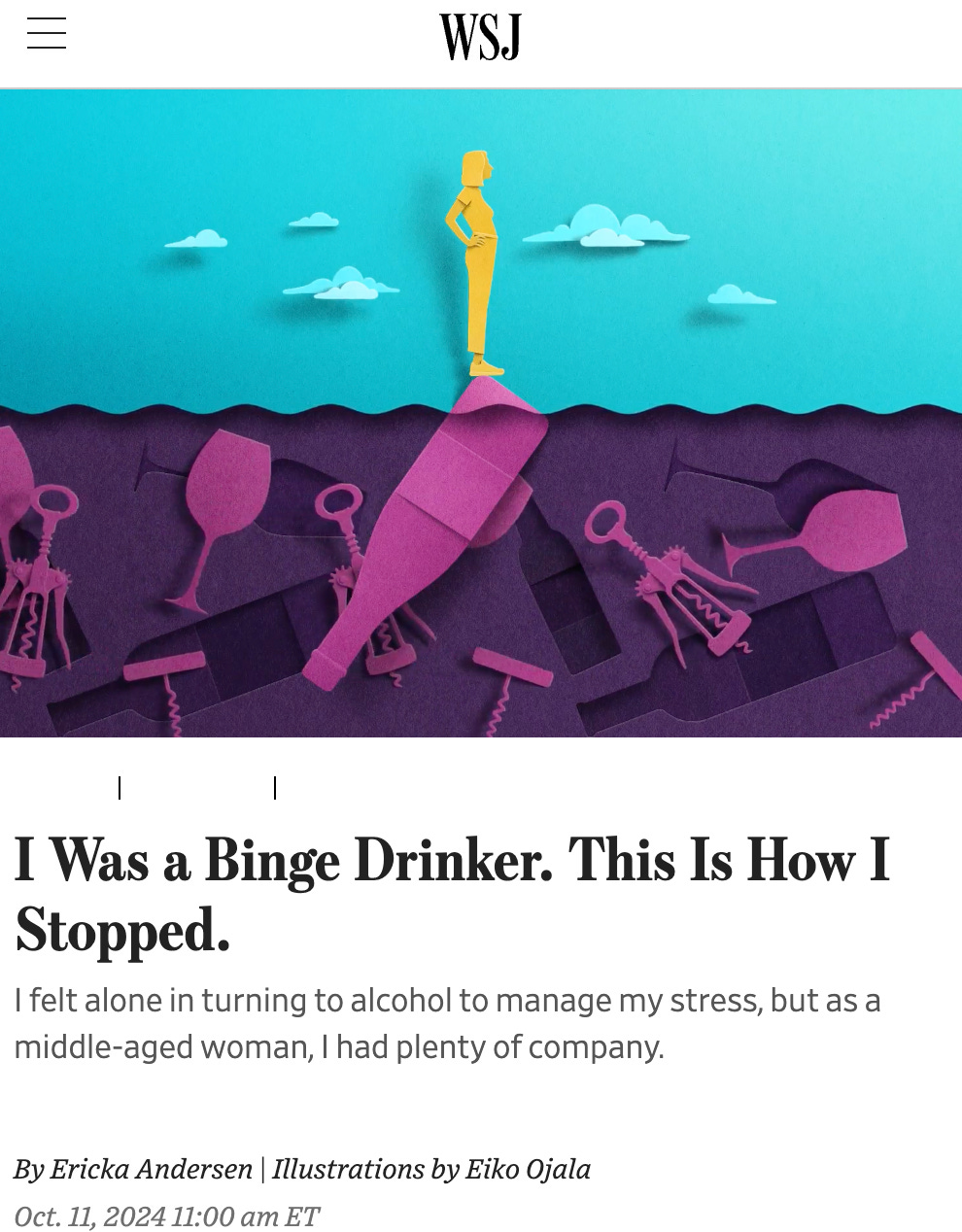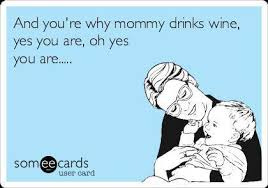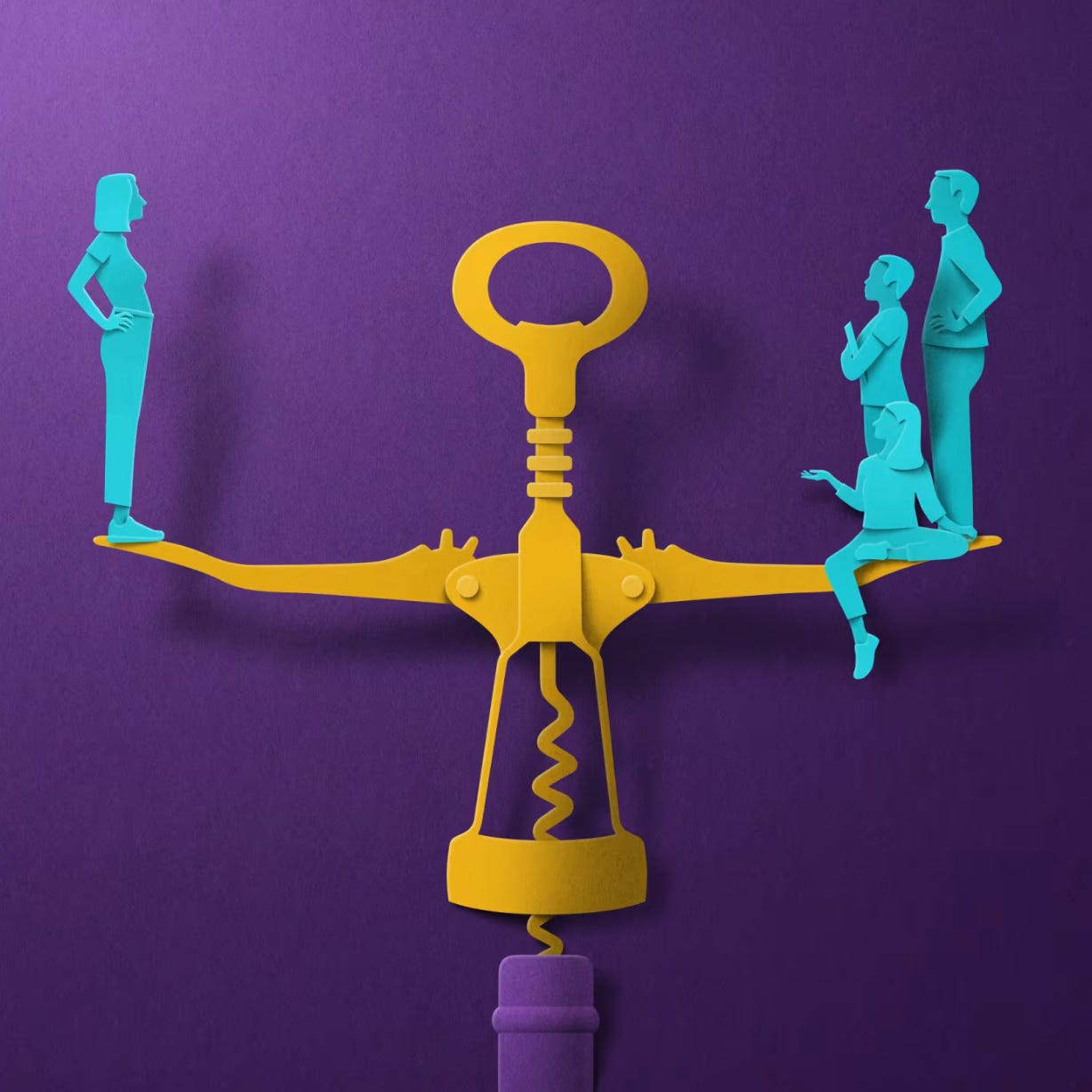The Toxic Relationship Between Women & Alcohol
Female deaths from excessive drinking have risen by 35% since 2016.
» You can find the full text of my new piece in the Wall Street Journal below the opening text.
Just like we’re waking up to the toxic food all around us, women are recognizing the poison (physically, emotionally, and spiritually) that alcohol is in their lives and bodies.
For too many years, we were trying to “keep up with the boys” and have some fun instead of being the “responsible” ones.
As it turns out, drinking isn’t the answer to our unfulfilled, overstimulated, hyper-driven lives. Maybe we thought it was, but we were wrong. Maybe they told us it was, but they lied.
And some of you — with biological predispositions, trauma, and younger start dates — were more devastated than others. That’s not your fault. It really isn’t.
We didn’t know when we had our first drink.
We didn’t know when we had a glass of wine to relax.
We didn’t know when we drowned our heartbreaks together over margaritas.
We didn’t know when we laughed at our hangovers and told ourselves it was normal.
We didn’t know when we couldn’t remember last night. They said we were in our 20s & cie la vie…
We didn’t know when our drinking led to fights & phone calls
We didn’t know when we “needed” a drink a week after giving birth.
But once we knew, it was the greatest of gaslighting. There was an issue, but everyone said there wasn’t. Everyone said to have a glass of wine because you deserve it, you stressed out mom, you.
Finally, you stopped believing it was all good. And you learned a few things you couldn’t unlearn.
You saw the way this “harmless” substance so ever-present at all the happy, sad and celebratory things…had also ruined families, shortened lives and been used by the Evil one to lie and steal and kill and destroy.
You knew that you weren’t like everyone else when it came to alcohol.
You knew the secret Googling, stolen sips and constant preoccupation with the presence of or amount of alcohol in a cabinet near you wasn’t normal.
Not everyone struggles with alcohol, but if you’re asking the question…you already know.
And it doesn’t have to be “that bad” or any label. It’s just you and your life. Is it better with or without it? You know.
*All images and text below were originally published in the Wall Street Journal.
Around five years ago, I told my doctor that I was under a lot of stress. With two toddlers, a full-time job and all the trappings of a modern suburban life, everything felt hectic—all the time. My blood work was fine and I was otherwise healthy, so the doctor wasn’t concerned. Gazing into my tired eyes, she suggested a glass of wine might help me unwind in the evenings.
As it happens, I was already drinking up to a bottle of wine several nights a week. But I didn’t tell her that.
Addiction is in my genes, and I’d had an unhealthy attachment to alcohol from my first drink at 16. In moments of sadness, loneliness, stress or frustration, alcohol had become my most loyal companion.
I tried to convince myself that my drinking wasn’t a problem. Although I looked forward to my first drink of the day, I’d wait patiently until around 5:30. I rationalized that a little wine was a relatively innocuous way to overcome the dread of cooking dinner or lighten the drudgery of drawn-out bedtime routines.
Wine helped ease the tension of these witching hours, when the composure I’d mustered throughout the day began to unravel. But one drink led to another, and I’d wake up in a dark mood, with an aching head and a short fuse.
I felt alone in my quiet drinking at home, but it turns out I had plenty of company. Various studies and surveys have shown that binge-drinking is on the rise among middle-aged women. Men are more likely than women to overdrink, at 36% to 18.8% in 2023, but the rate of women aged 35 to 50 consuming five or more drinks in a row in a two-week period increased almost twice as fast as that of men between 2012 and 2022, according to nationwide surveys by the University of Michigan.
Men are still more likely to die from drinking-related causes than women, but this gap is narrowing, too. According to the Centers for Disease Control and Prevention, deaths from excessive alcohol use increased 26.8% between 2016 and 2021 among men, but 34.7% among women.
Nick Mathews, founder of Stillwater Behavioral Health, a drug and alcohol treatment program with centers in California, saw a spike in demand during the pandemic. He told me that many women, “including mothers, faced a lack of external resources and social outlets. This led them to turn to alcohol as a coping mechanism because they didn’t have the same opportunities for self-care and social interaction.”
Studies show that women are more likely than men to use alcohol to help cope with stress.
The stress of the pandemic certainly nudged more women to drink in excess. In research published in JAMA Health Forum this year, women aged 40 to 64 saw a stark rise in alcohol-related hospital visits in 2020 and 2021.
Through a glass darkly
America’s maxed-out, stressed-out, burned-out women are clearly drinking too much. I used to be one of them. Between hustling at work, managing daycare schedules and keeping up the appearance of contented normalcy at church, I found it hard to take the time to slow down and consider why I’d obliterate so many of my nights and wake up feeling hung over. Instead I popped Excedrin, guzzled Gatorade and coffee and pretended I was fine.
Four years ago, something changed. I had just spent a Sunday afternoon drinking with my neighbors—fellow parents of young children—and I woke up feeling ill and regretful. I promised myself it was time to stop this constant cycle of binge and remorse. But then, hours later, I was at a book club bargaining with myself over how much of the free-flowing wine I would drink.
Why did I think I needed to drink to get through an evening among friends? Alcohol, long a source of relief, had become a trigger for self-loathing. The pandemic, which I spent working from home with a 2- and 4-year-old, had moved me to drink more. But after a summer of bingeing, I realized I had a problem. It was Sept. 30, 2020, and I’d had enough.
Sober October, a popular annual challenge in which people abstain from alcohol for the month, started the next day. Feeling flustered and disappointed with myself, I committed to a month of sobriety. I needed to prove to myself that I could regain control.
With hindsight, I can see how easy it was to drink away my evenings. My social-media accounts are filled with “mommy drinking” memes and merch, such as wine glasses engraved with “Mommy Juice” and pink T-shirts that say “Wine O’clock!” My trips to Target involve passing cases and coolers filled with fruity, low-cal alcoholic beverages in cheerful bottles and cans, marketed as sources of you-go-girl empowerment, pleasure and self-care.
The rosy-hued zeitgeist seems to be that alcohol is a fun and easy way to take the edge off, particularly if you’re a mom. But as the rise in drinking-related deaths and hospitalizations among women demonstrates, this trend in self-medicating is hardly cost free.
“Because alcohol is both socially acceptable and legal, people underestimate its potential for harm,” says Caroline Newton, an addiction psychiatrist in Connecticut. She notes that significant life stressors, including divorce and infertility, can escalate casual drinking, which can lead to a rising tolerance of alcohol dependence.
This is a particular problem for women as studies consistently show that they are more vulnerable to alcohol-related health risks than men, including cancer, stroke and liver damage. A study published in the journal Addictive Behaviors in 2021, for example, found that heavy-drinking women were up to two times more likely to have been diagnosed with a “significant medical condition,” including cancer, than heavy-drinking men.
Given the ways alcohol is often framed as a cheap and legal source of escapism—something that can be enjoyed while cooking or cleaning or wrangling the kids—many women don’t see their drinking is a problem. Others feel they lack the time or money to manage their stress another way. After all, drinking is cheaper than therapy and easier than yoga or meditation. The relief it offers may be temporary, but it is also immediate.
“We’ve allowed ourselves to be marketed to while ignoring all the science, which is very clear about alcohol: it worsens anxiety, depletes white matter in the brain, totally corrupts sleep, and it’s a Group 1 carcinogen,” said Paige Rien, a former HGTV host who’s been sober for years. “Drink if you want, but know the science.”
Mommy’s little helper
The “mental load” of motherhood often includes largely invisible stressors like filling out forms, maintaining schedules, shopping for clothes and groceries, and meeting with teachers. Such constant vigilance—the sense that there is always something that needs doing or buying or cleaning—is exhausting.
Finding time for actual self-care is a challenge many know too well. Even when women are primary breadwinners, they still tend to devote more time to child care and housework and less time to leisure than their husbands, according to a 2023 Pew Research Center survey.
The circumstances that drive many middle-aged women to drink are also what may prevent them from seeking treatment. A 2023 study published in the journal Drug and Alcohol Dependence found that women often reported “gendered responsibilities,” such as caregiving, as a significant obstacle for seeking treatment. The same study found that women who struggle with substance abuse are “more likely than men to perceive stigma for seeking help.” Many worry that by admitting they have a problem, they could compromise their access to their children—or their standing as a mother.
The pandemic may have driven more women to drink, but it also offered more pathways to treatment. Before 2020, there was less awareness of the problem and fewer ways for women to commune online. Today, groups such as Sober Mom Squad and Sober Sis boast tens of thousands of members.
“Connection is the ‘secret sauce’ and often the antidote to addiction,” says Sober Sis founder Jenn Kautsch. She notes that membership boomed between 2020 and 2022 and has remained elevated. Though Sober Sis was one of the few programs with online support meetings before the pandemic, the group grew its capacity in 2020, when many women felt some pressure, in Kautsch’s words, to “renegotiate their relationship with alcohol.”
Hearing from and communicating with fellow women in this way certainly made a difference in my recovery process. I joined an online support group called the Luckiest Club, which hosts multiple open daily meetings online, some of them “women’s only.” Seeing fellow women—teachers, mothers, doctors, writers—grappling with their dependence on alcohol helped me realize I wasn’t alone.
Most people are unaware of recovery programs outside of Alcoholics Anonymous. Even googling treatments for alcohol abuse can feel scary for people who don’t want anyone else to know that they are struggling. Some mistakenly assume they need help only when they hit “rock bottom.”
“What really wore me down was the constant mental battle over wine—why couldn’t I stop at two glasses? Why did it seem like everyone else could drink normally while I felt powerless to control it?” said Christy Osborne, an author and sobriety coach, whom I met through a group I joined for people who are writing about addiction and mental health. Osborne says her breaking point came when she realized she was “utterly fed up” with “the relentless cycle of waking up at 3 a.m., heart racing with anxiety, and then struggling to find patience with my kids the next day.” Her last drink was in 2019.
The last drop
When I started Sober October, my commitment was for the month. The prospect of anything longer was too daunting to think about. Someone in one of my recovery groups said it took at least 90 days to feel like she wasn’t “white knuckling” it. Her observation offered both validation and a goal.
The struggle did ease a bit when I hit 90 days, but my first full year of sobriety still felt endless. I tracked my days on an app, attended online meetings and gritted my teeth through alcohol-infused birthday parties, ballgames and concerts. For the first rock concert I attended sober, I made sure I had a full stomach, plenty of water and a friend on hand to text if I felt weak. I let myself drink Red Bull and eat a bag of sour gummy worms for the sugar rush.
Giving up alcohol was hard. I tried and failed many times. But within a few months I found that I was no longer plagued by midnight anxiety, morning headaches or afternoon cravings. I gained energy and clarity and revived my relationship with God.
Instead of whispering the same daily prayer to be “free” from the hold of alcohol, I began investigating the root causes of my dependence, including my over-commitment at work, my concerns about my marriage and my anxieties about my patience and wisdom as a mother.
By setting healthier limits in my life, I found I had the space and energy to finish writing my second book, be more present with my children and work through the problems I had spent years muffling with wine, including my insecurity about my body and my fraught relationship with my own parents.
Sobriety requires vigilance. It is an intentional, daily choice. Life is still stressful, and I still sometimes feel that familiar pull toward a bottle of wine around 5 p.m., but I now know to “play the tape forward.” I remember how my nights were once filled with desperation and anxiety. I imagine how I would feel nursing a hangover in the morning. I know how that movie ends and, for me, it’s just not worth it.
Ericka Andersen’s forthcoming book is “Grace in the Glass: How Women of Faith Wrestle with Alcohol,” which will be published by InterVarsity Press.
Appeared in the October 12, 2024, print edition as 'I Was a Binge Drinker. This Is How I Stopped. How I Stopped My Binge Drinking'.
Hey there — if you made it this far — wow, I’m impressed! Whether you’re new or old to this Substack, I want to say I’m glad you’re here.
I’m Ericka, wife and mom to two crazies, author, Christian, Enneagram 4 and person with too many ideas. Oh yeah, also, sober for 4 years and willing to tell my story to anyone so that other people can find freedom too.
Maybe you needed what was in today’s post. Maybe you’re struggling. I meant what I said: Much of this isn’t your fault. You aren’t weak or bad. You’re not hopeless or impossible. You’ve been lied to and coerced and hoodwinked and gaslit — all the things.
As my 6 year old daughter likes to say, “Being 6 is hard.” And I reply to her, “Yes, being 6 is hard. So is being 16 and 36. Every stage of life has it’s own hard.”
It’s not your fault that you’re here, but it is your responsibility. That said, you needn’t be perfect at this. Actually, if you’re perfect, I don’t want you here — bye! ;)
I’d love to have you stick around, so subscribe to my Substack. Grab my free resource kit for Christian women who want to quit drinking here: SobrietyCurious.com.
The best way to support this newsletter is to buy a copy of my books, share, and leave a review on Amazon + Goodreads. I appreciate every single purchase + review!
Reason to Return: Why Women Need the Church & the Church Needs Women
Leaving Cloud 9: The True Story of a Life Resurrected From the Ashes of Poverty, Trauma and Mental Illness












A doctor recommended wine to deal with stress?
Thank you. Spoke directly to me.